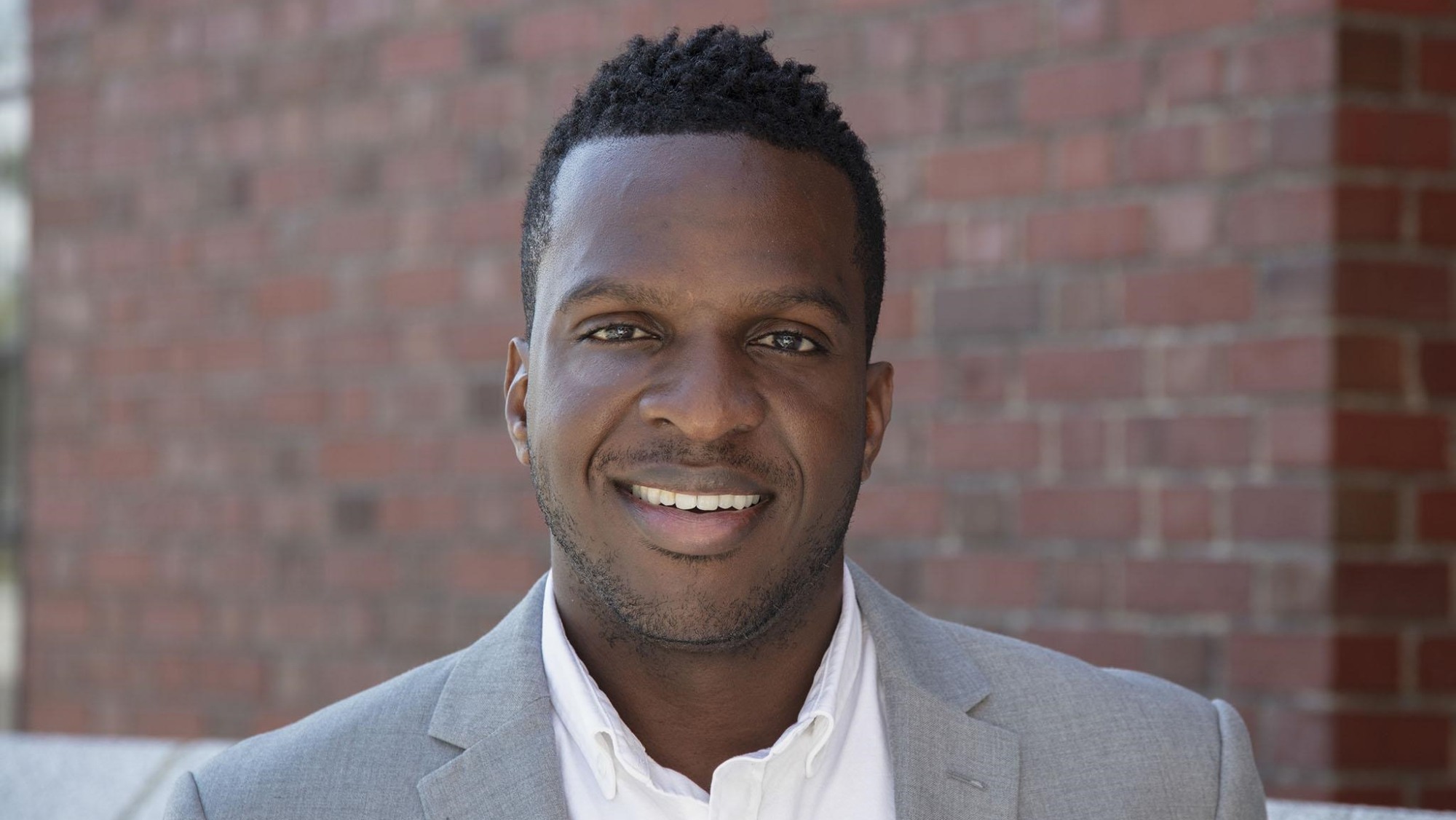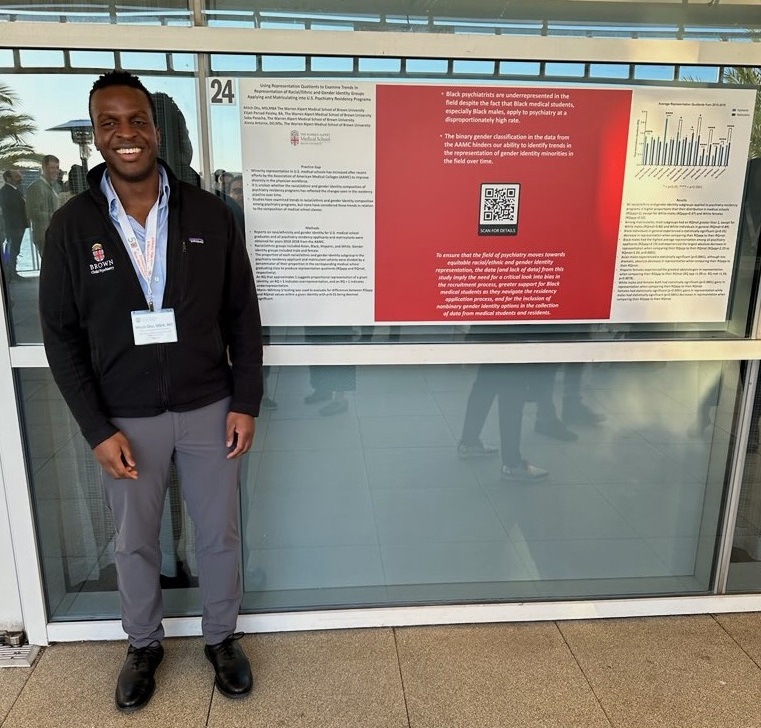Clinician Cameo: Pediatric Emergency Psychiatrist Mitch Otu
The Clinician Cameo is a monthly interview series with a clinician in the Brown Department of Psychiatry & Human Behavior.

Mitch Otu, M.D., M.B.A, is an attending physician in the emergency department of Hasbro Children’s Hospital and clinical director of the Psychiatry Access, Continuity, and Evaluation (PACE) Clinic, which provides short-term, outpatient psychiatric care for children and teens waiting to enter an ongoing treatment program. He is a clinician educator and assistant professor at the Brown Department of Psychiatry & Human Behavior (DPHB).
Otu taks with DPHB about emergency pediatric psychiatry, physician burnout, and the surprising benefits of the TV show Ozark…
What drew you to the emergency side of pediatric psychiatry?
I love the fast pace and being able to come up with a good plan to triage people in crisis. In those moments, I’m also trying to bring some levity: Can we bring a smile to this moment, even though there are so many big, important, serious, and sometimes sad, things going on? Can we bring a little bit of light to the moment?
What’s an example of how you might try to lighten things a little bit?
There was a kid who came in earlier this week and was suicidal and obviously talking about a lot of tough things. At one point, they brought up something they were watching on TV and we just took a detour for a good five, ten minutes riffing on random shows we’d both seen and other things we enjoy. Obviously that’s not the focus of why they’re there, but for that moment, I can see their affect change and see there’s this light at the end of the tunnel.
For me, at least, in child psychiatry, that feeling is always there: There’s a light at the end of the tunnel. These kids are oftentimes really resilient. If we can just see that smile for a second, even if they need to go inpatient, at least in that moment, I’ve got the feeling they’re going to be OK.
Out of curiosity, what was the TV show that got you guys started?
Ozark [laughing]. I actually had stopped watching it, because I thought, “This show’s…I don’t love it, it isn’t great.” And then I finished it two months ago and was like, “Oh my God, I love it!”
For me, at least, in child psychiatry, that feeling is always there: There’s a light at the end of the tunnel.
What themes do you see in terms of who’s coming in for care or what emergencies they’re facing?
A lot of what kids are dealing with is not necessarily biological in nature. It’s mostly systemic issues, like family conflict or bullying at school. I just saw a girl yesterday who hasn’t been to school in the past two weeks, because school is a toxic place for her to be. There isn’t necessarily a medication for that. How do we address that so that the kid can get better?
The other big piece would be trauma. A lot of the kids we’re seeing have gone through traumas early in life that have potentially set up their nervous systems in a way that makes it difficult for them to respond differently. We know that we can help change that.
What are some common misconceptions you encounter about either pediatric emergency psychiatry or the PACE Clinic?
Sometimes people, even providers, may send kids to the hospital for things that are absolutely concerning, like self-harm or cutting, but not suicidal in nature and we may not be able to admit them. So we may end up sending kids back to their outpatient providers, hopefully with some new referrals or new tools we’ve tried to teach them in the ED. But we’ve only got a couple of hours with them here.
For kids who don’t have providers, we’re able to send them to the PACE Clinic, where they can continue in short-term treatment until they find a long-term provider. I’ve worked in other settings where it wasn’t like that. When I did my residency training in Miami, the ED was just an in-or-out decision. We didn’t have places to refer kids to…or even adults, really. It feels so much better to have services here that we can step people down to. Hopefully, they’re going to be effective and we can prevent kids from coming back to the ER repeatedly.

What aspect of the Child & Adolescent Psychiatry Fellowship at Brown was most helpful in preparing you for the work you do now?
For me, it was the openness and flexibility of the program. During the second year of fellowship, apart from a couple weekly requirements, you make your own schedule. I sat in at the Aubin Center for a couple of months and saw patients who were being evaluated for abuse or neglect. I really enjoyed collaborating with the child abuse pediatricians there. Dr. [Elizabeth] Lowenhaupt was one of my close mentors on that project.
We also worked with kids in the juvenile justice system, whether they were at the Rhode Island Training School or after they had left incarceration, plus a lot of kids in group homes, foster homes, residential placements. I really appreciated that Brown gave me that opportunity to do that. By that last year of fellowship, they turn you loose and say, “Hey, you’re going to be an attending next year. Go do what’s going to set you up for your career.”
Helping children in crisis must be emotionally intense work. How do you recharge when you’re not in clinic?
One thing that happens while I’m in clinic and in the emergency room is team-based work that I find really protective. In the moment, I can go to one of the people in our team, and say, “Hey, this situation is coming up. I’m having these feelings right now. Let’s talk about it.” We’ve also set up peer supervision time. We created something called the Monday Moment, where we take at least 15 minutes every Monday at 3 to sit back, talk about themes that have come up, and process what’s happening.
Outside of that, I try to leave things at work when I’m off the clock. I’ll play soccer, spend time with friends, listen to music…watch things like Ozark. [Laughing] It comes back and it ends up helping with the work!
Do you play soccer in a league or pickup games?
I play pickup with some people that I know, then a couple of us are also on a team. Last year, we played some first-year medical students I had taught in a “Brain and Behavior” course. Afterwards, I was like, “Oh, God, I hope I didn't say anything inappropriate in the heat of battle.” [Laughing] You know, you do some things, you say some things….
But it’s great to know, “OK, med students, you’re not just in the books all day.”
Did you beat the med students?
[Sheepishly.] We did.
Want to hear more from Mitch Otu? Listen to his Feb. 3, 2023 conversation about practical approaches to bullying with the podcast Mindcast: Healthy Mind, Healthy Child. Or watch this November 2022 segment on children's mental health with WPRI-TV:
{"preview_thumbnail":"/sites/default/files/styles/video_embed_wysiwyg_preview/public/video_thumbnails/v7xkPJX7aXM.jpg?itok=-0oesYG6","video_url":"https://www.youtube.com/watch?v=v7xkPJX7aXM","settings":{"responsive":1,"width":"854","height":"480","autoplay":0},"settings_summary":["Embedded Video (Responsive)."]}